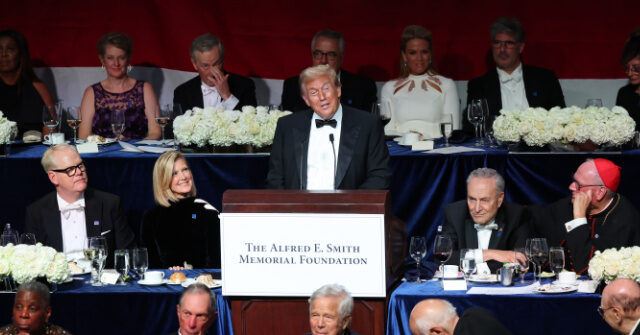The Al Smith Dinner, a traditional event aimed at fostering civility and camaraderie among political figures, faced criticism for its lack of balance this year, primarily due to Vice President Kamala Harris opting not to attend in person. Cardinal Timothy Dolan articulated this sentiment prior to the event, expressing disappointment that Harris’s absence would undermine the evening’s purpose of bringing diverse individuals together in a spirit of patriotism and humor. He emphasized that the dinner is not merely a campaign stop but an occasion meant to cultivate respectful dialogue among political adversaries through light-hearted exchanges.
In place of her live attendance, Harris chose to submit a pre-recorded message, which many attendees found lacking in substance and respect. Her video, which featured a comedic skit alongside former Saturday Night Live cast member Molly Shannon, fell flat and did not resonate with the audience, eliciting minimal laughter. Critics described Harris’s decision to deliver a taped appearance as “disrespectful” and characterized it as a missed opportunity to engage with a key demographic—Catholic voters—who are significant in the political landscape.
In stark contrast, former President Donald Trump took the stage and quickly captivated his audience with a series of edgy jokes. He addressed the absence of Harris humorously, asserting that polls indicated his substantial lead among Catholic voters and suggesting that her decision not to attend reflected disinterest in this crucial voting bloc. Trump’s comedic approach highlighted the unfortunate timing of Harris’s absence, humorously speculating on her alternatives rather than joining the Al Smith Dinner, including a jab at her receiving Communion from Michigan Governor Gretchen Whitmer.
Trump’s performance was marked by audacity, touching upon themes that resonated with the audience, particularly jabs at Harris and the Democratic Party. His remarks included tongue-in-cheek suggestions for how the event organizers might have better piqued her interest, making light of serious issues by implying that financial incentives tied to political protests might have enticed her participation. This particular brand of humor, sharp and at times irreverent, seemed to strike a chord with attendees, who responded positively to his comedic timing and delivery.
The political ramifications of Harris’s absence were not lost on observers, with Republican National Committee Chair Michael Whatley labeling it a significant misstep in her campaign strategy. His condemnation resonated with the sentiment that Harris’s failure to attend was not merely a personal choice but rather a decision that potentially alienated Catholic voters and detracted from her party’s outreach efforts. This narrative prompted discussions regarding the future implications for the Democratic Party as they navigate relationships and engagement with pivotal voter demographics before an impending election cycle.
Overall, the evening underscored the importance of political appearances and engagement, particularly in an era characterized by heightened partisanship and polarization. The contrast between Harris’s pre-recorded absence and Trump’s live presence at the Al Smith Dinner highlighted the stakes of political visibility and connection with constituents. As the election approached, both parties were reminded of the critical need for strategy and presence in pivotal social and cultural spaces, where humor and civility could either strengthen or undermine their outreach efforts.

